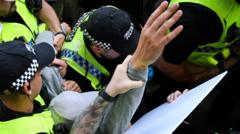Who Are the Six Charged with Terrorism for Supporting Palestine Action?

Published: 2025-09-03 22:14:11 | Category: technology
This article discusses the recent charges against six individuals for terrorism-related offences linked to the banned group Palestine Action. The Metropolitan Police allege that these charges stem from public gatherings and online meetings held in support of the group, which was proscribed under UK terrorism laws in July 2023. The ongoing investigation raises significant questions about free speech, protest rights, and the implications of supporting a group classified as terrorist.
Last updated: 27 October 2023 (BST)
Key Takeaways
- Six individuals have been charged with terrorism offences related to the banned group Palestine Action.
- The charges arise from public demonstrations in London, Manchester, and Cardiff over the summer.
- More than 700 arrests have occurred since the group was proscribed on 5 July 2023.
- The group's activities included arranging protests and managing Zoom meetings to promote its agenda.
- The upcoming protest in London is expected to attract over 1,000 participants.
Background: The Proscription of Palestine Action
Palestine Action was banned under UK terrorism laws following incidents that included vandalism at military facilities, notably the £7 million damage caused by paint being daubed on jets at RAF Brize Norton. This drastic step was taken by Home Secretary Yvette Cooper on 5 July 2023 in response to activities deemed as serious criminality. Since the ban, the group has been labelled as a terrorist organisation, leading to severe legal consequences for its members and supporters.
Legal Implications of Supporting a Proscribed Group
Under the Terrorism Act, membership or support for a proscribed group like Palestine Action can result in lengthy prison sentences, potentially up to 14 years. This stringent law aims to deter individuals from engaging with or promoting organisations that are considered a threat to national security.
The Recent Charges: Details and Context
The six individuals charged on Wednesday were arrested during a series of police operations across various locations, including London, Cumbria, and South Yorkshire. Their charges relate to organising public demonstrations and conducting 13 Zoom meetings aimed at supporting Palestine Action during July and August. These activities are seen as part of a broader investigation by the Met's Counter Terrorism Command, highlighting the police's proactive approach towards any actions perceived as endorsing the banned group.
Upcoming Demonstration and Public Response
Despite the legal troubles surrounding its members, a protest is scheduled for Saturday near the UK Parliament, where more than 1,000 people are expected to gather. Organisers have stated that demonstrators will carry signs like "I oppose genocide. I support Palestine Action," signalling their intent to publicly defy the government's actions against the group. This planned demonstration underscores the ongoing tensions between government policy and public sentiment regarding the Israel-Palestine conflict.
Statements from Law Enforcement and Advocacy Groups
Detective Chief Superintendent Helen Flanagan has indicated that the arrests and charges stem from a thorough investigation into Palestine Action’s activities. She warned that individuals found guilty of supporting the group could face "potentially serious consequences." Meanwhile, advocacy group Defend Our Juries has described the arrests as "scandalous," arguing that they infringe upon the right to free speech and legitimate protest.
The Debate Over Free Speech and Protest Rights
The arrests and the ban on Palestine Action have sparked a significant debate over the balance between national security and individual freedoms. Critics argue that the government’s actions could stifle legitimate dissent and undermine the principles of free speech. Lawyers for Huda Ammori, the group's co-founder, have taken the stance that the proscription breaches fundamental rights and have sought to challenge the legality of the ban in court.
The Legal Challenge Ahead
Last month, Palestine Action received permission to contest the ban, with the case set to be heard at the High Court in November. However, an appeal to temporarily lift the ban was rejected, meaning that the group's status remains unchanged until a full review can take place. This upcoming court case will be closely watched, as it has the potential to set important legal precedents regarding the treatment of protest groups within the UK.
What Happens Next?
The legal landscape surrounding Palestine Action and its supporters continues to evolve. The outcomes of the upcoming court challenges and the reactions to the planned protests this weekend will likely influence public discourse on the issues of terrorism, free speech, and the rights of protestors in the UK. As the situation develops, observers will be keen to see how the government and law enforcement balance the need for security with the rights of individuals to express dissent.
As the legal proceedings unfold, the implications of these charges on the broader political and social landscape in the UK remain to be seen. Will the government's stringent approach to groups like Palestine Action deter future protests, or will it galvanise further activism? The answers may shape not only the future of Palestine Action but also the dynamics of protest in the UK as a whole. #PalestineAction #TerrorismCharges #FreeSpeech
FAQs
What is Palestine Action?
Palestine Action is a group that has been proscribed as a terrorist organisation in the UK. It advocates for Palestinian rights and has engaged in protests and direct actions against companies perceived to support Israel.
What does it mean to be proscribed under UK law?
Being proscribed means that an organisation is officially designated as a terrorist group under UK law, making it illegal to support or be a member of that group, with severe legal penalties for violations.
What are the potential consequences for supporting a proscribed group?
Individuals found guilty of supporting a proscribed group, such as Palestine Action, can face significant legal consequences, including imprisonment for up to 14 years under the Terrorism Act.
What is the significance of the upcoming High Court case?
The High Court case set for November will determine whether the ban on Palestine Action is lawful, potentially impacting the group's future and the rights of individuals to express support for its cause.
How has the government justified the ban on Palestine Action?
The UK government argues that the ban on Palestine Action is necessary to prevent serious criminality, describing it as a targeted action against a group that poses a threat to public safety.



